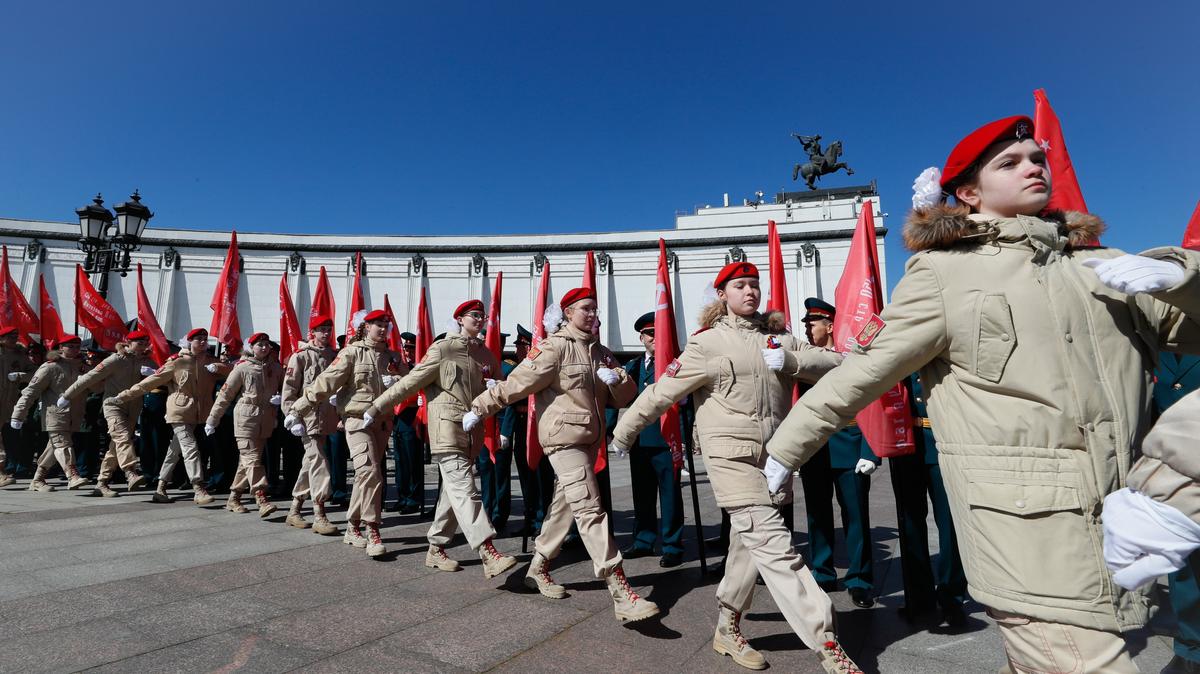While many Russian social programmes are being cut to meet the needs of the country’s ever-growing wartime budget, one expense is allowed to grow unchecked: state spending on so-called “patriotic education”, and in particular, the Movement of the First, a state-backed youth organisation created in 2022 to unite schoolchildren under a patriotic banner.
A personal initiative of Vladimir Putin himself, the movement now claims to have over 13 million members, having absorbed almost every previous youth project in the country. The “new Pioneers”, as many ominously call them, fill social media with choreographed dances, motivational slogans and patriotic soundtracks. Yet when you scroll through TikTok, it quickly becomes clear that most teens join not for ideology but for perks — free travel, school credits, trendy merch, or simply a break from class.
In one viral clip, two girls in white movement t-shirts dance to a pop song by the little-known artist Stas More. Behind them, the peach-coloured plaster walls and fluorescent strip lighting are redolent of a typical youth centre somewhere deep in the Russian provinces.
The video’s star, Kristina from the western Russian city of Belgorod, says a local youth worker asked her to film it. At the time she wasn’t part of the movement — but the clip hit a million views. “It was such joy when it blew up!” she laughs. “They praised us, showed our video as an example to other teams.”
Soon after, Kristina joined the Movement of the First, which has built a strong presence on TikTok, where members post near-identical dances and self-descriptions of their “active civic position”. The comments sections are as divisive as you might expect, with some users cheering them on, while others mock them for being “zombies”, “Putin’s pioneers” or “the Movement of the Last”.
“I love sport, choreography, filming videos — it’s fun … I just enjoy it,” Kristina says, remaining diplomatic about some of the online blowback. “There are a lot of angry people,” she says. “Maybe they had a bad experience or fought with someone in their team. We just ignore that.”
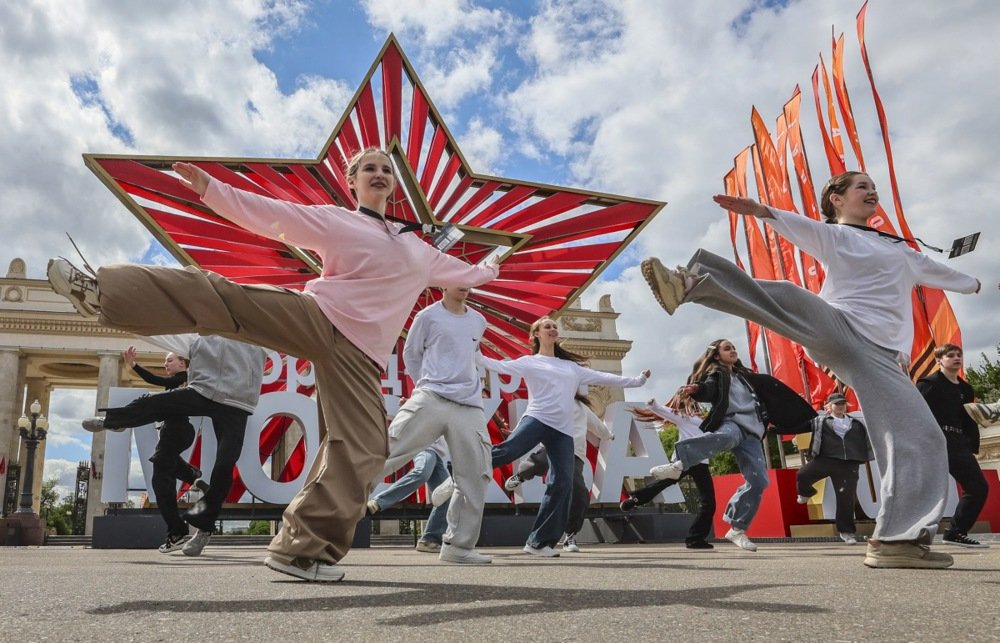
Teenagers dance in front of a star installed to mark Victory Day in Moscow, Russia, 5 May 2025. Photo: EPA/YURI KOCHETKOV
Putin first
The Movement of the First is headed by a supervisory board that is chaired by Putin himself, with all appointments to the body and beyond in his gift. Membership of the movement is open to children aged 6 to 18; adults can join as mentors.
Its structure mirrors that of both the Pioneers and Komsomol, Russia’s main Soviet-era youth movements, albeit with a modern twist. Local “primary organisations” are based in schools and youth centres, often run by teachers moonlighting as “advisers on patriotic upbringing”. Many of these initiatives — flash mobs, contests, volunteer days — are designed in Moscow and replicated across the regions.
The sheer scale of this new Putinist behemoth is enormous — over 70% of Russia’s approximately 18 million schoolchildren have already enrolled, according to the organisation’s own figures, though while many have joined voluntarily, others haven’t made the decision to join its ranks quite so freely.
Whether they’re enthusiastic or indifferent, the movement has no shortage of members.
Although officials insist membership is voluntary, reports of pressure being exerted on those who choose not to do so abound. In St. Petersburg, for instance, teachers told parents they were “strongly advised” to register their children.
“Honestly, in schools it’s pretty much obligatory,” says Nikolay Belkin*, who joined the movement as a teenager in Russia’s Far East and continues his association today as a mentor, posting upbeat TikToks promoting the movement. According to Belkin, there’s a membership quota for each school, “so they just take a whole class and sign everyone up”.
Alina, another member, estimates that roughly 20% of the movement’s members “were forced to sign up”, before complaining that those who didn’t join voluntarily “do nothing at events, we handle everything without them”.
Kristina also says she knows “a few people who were kind of dragged in”, but adds that it doesn’t really bother her. “In some rural schools the movement has to be represented, but not many want to join. I think it’s just laziness,” she shrugs.
Whether they’re enthusiastic or indifferent, the movement has no shortage of members.
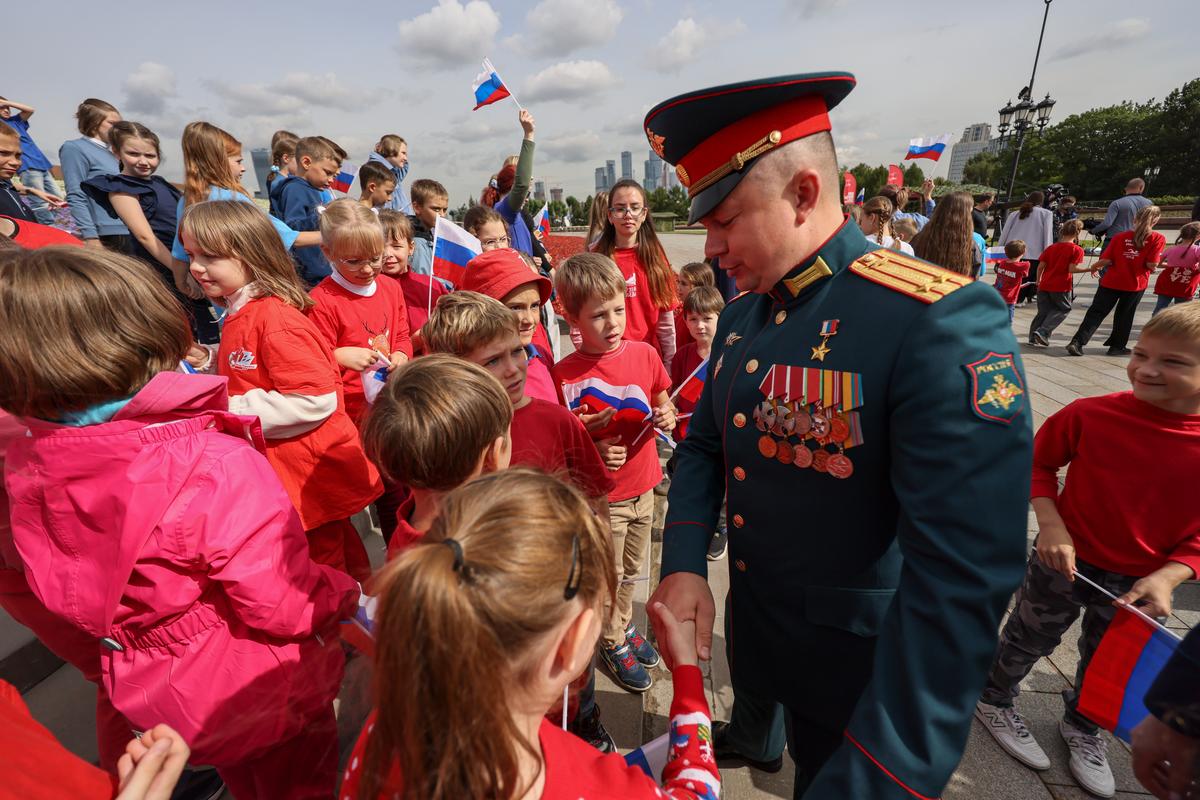
Chairman of the Movement of the First, Artur Orlov, meets children during Russian National Flag Day celebrations in Moscow, 22 August 2025. Photo: EPA/SERGEI ILNITSKY
A patriotic budget line
Since 2023, The Movement of the First has been funded to the tune of around €200 million annually from the federal budget. Last year, a veteran of the Syrian and Ukrainian wars, Artur Orlov, was appointed to be the movement’s chairman. Under him, the focus on patriotism — and militarisation — has grown.
Most of the movement’s flash mobs coincide with key military holidays such as Defender of the Fatherland Day on 23 February and Victory Day on 9 May. Members planning to create content to mark the occasion receive guidelines on what to film and what songs to use.
“I began to love patriotic songs thanks to the movement. But I also listen to XXXTentacion or church hymns — it depends on my mood.”
“I began to love patriotic songs thanks to the movement,” Kristina says, naming Forward, Russia by staunch Putin supporter Oleg Gazmanov among the songs she has enjoyed. “But I also listen to XXXTentacion or church hymns — it depends on my mood.”
At some movement events, children even mimic military roles such as drone operators, medics, political officers and stormtroopers — and compete with one another in shooting, drone control and Kalashnikov assembly, while following the International Criminal Court issuing an arrest warrant for Putin in 2023, the movement staged a “We Are All Putin” flash mob, posting selfies with pro-Kremlin slogans.
Yet even among members, enthusiasm for the more outwardly patriotic aspects of the movement’s output is limited. “They put extra emphasis on patriotism now because of the situation,” says Belkin carefully. “But there are other directions too. It’s just that patriotism gets twice as much attention.”
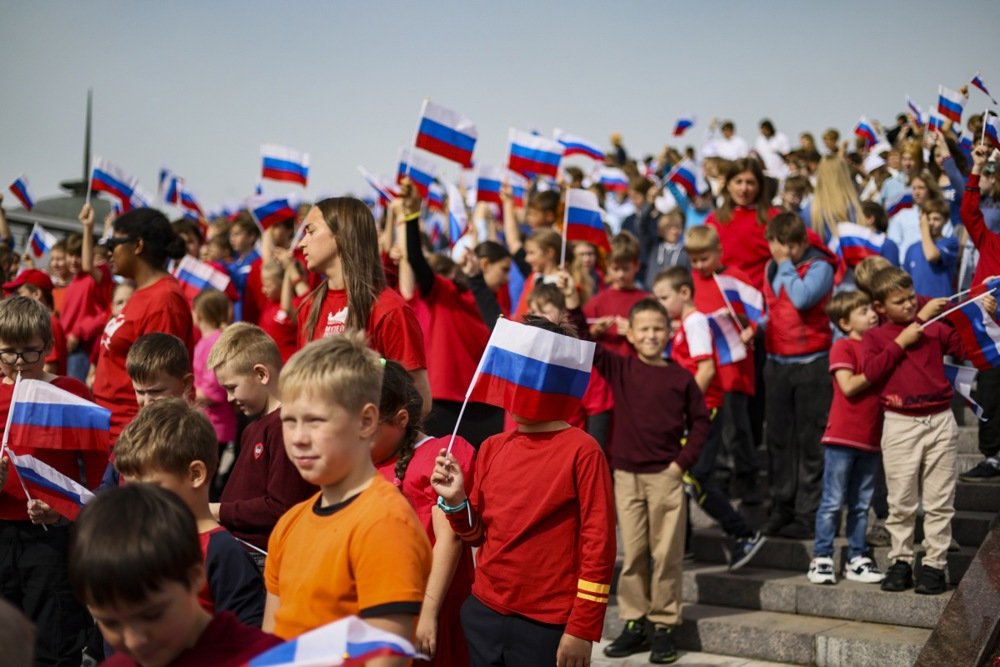
Members of various Russian youth organisations wave Russian flags to mark National Flag Day in Moscow, 22 August 2025. Photo: EPA/SERGEI ILNITSKY
Pioneering perks
Scroll through the movement’s TikTok channel and the tone is far lighter, however. Under videos tagged#MovementOfTheFirst, teens list practical reasons for joining: skipping classes for events, travelling for free across the country, and even getting bonus points for university entrance exams.
“It’s silly not to join when you can make your future better. I’m not super patriotic, but who says no to free trips?” one commenter says.
“The movement gave me a chance to hang out, listen to great speakers, find my own space,” Belkin recalls, adding: “It really lets you travel and meet people. All my trips were paid for.”
The trips Belkin is referring to include visits to two of Russia’s main allies, North Korea and China, though he avoids answering the question of why Western countries are off the list.
“I’m not super patriotic, but who says no to free trips?”
Kristina, asked about such trips and about the war in Ukraine, says simply: “I don’t really get into politics. If something bothers me, I’ll talk to people who understand it better,” before adding that “I’d just like more TikTok projects — short videos, not only on TikTok but also Instagram or VK.”
Tatyana from Bryansk echoes her: “They don’t tell us to support anyone. Everyone decides for themselves.” According to her, after every forum or event, members fill in anonymous feedback forms.
For Darina, another Bryansk teenager, the organisation is a world of opportunity: “You can travel, meet cool people, learn new things. Honestly, I love everything about it. It gets better every year.”
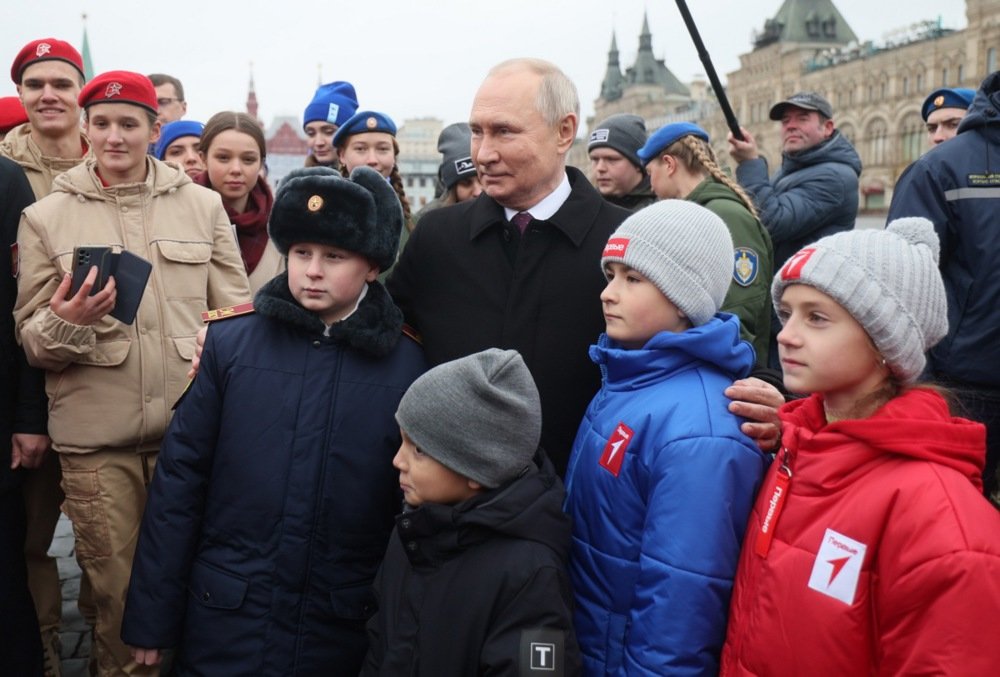
Vladimir Putin poses for a photo with members of youth organisations on Moscow’s Red Square, 4 November 2023. Photo: EPA / GAVRIIL GRIGOROV / KREMLIN
Systemic symbiosis
Psychologist and educator Lyudmila Petranovskaya believes teens in Russia today are pragmatic rather than ideological. “They know adults are trying to use them in these patriotic games — and they, in turn, use the system for their own benefit,” she says. “There’s no real passion or imperial patriotism left.”
Teachers, too, have their own incentives. According to Dmitry Kazakov, a former history teacher from the central Nizhny Novgorod region, school staff work hard to promote the movement mainly to impress the Education Ministry. “They lure kids in to meet quotas,” he explains. “Some children enjoy it, others don’t. It won’t make everyone think the same.”
“The consequences of all this hypocrisy will come later — and they won’t be good.”
Even Kristina admits that many classmates join for convenience. “Yeah, some do it just to skip classes for events,” she says matter-of-factly. “As long as they take part when needed, I don’t mind.”
She insists the experience still teaches something useful. “In any case, they gain some experience. Maybe they’ll appreciate it for real later.”
Kazakov doubts that’s the state’s goal, however. “The authorities want a more loyal generation,” he says. “But kids are still kids. The consequences of all this hypocrisy will come later — and they won’t be good.”
*Names have been changed
This article by Katya Orlova was first published by Russian media outlet Veter.
Join us in rebuilding Novaya Gazeta Europe
The Russian government has banned independent media. We were forced to leave our country in order to keep doing our job, telling our readers about what is going on Russia, Ukraine and Europe.
We will continue fighting against warfare and dictatorship. We believe that freedom of speech is the most efficient antidote against tyranny. Support us financially to help us fight for peace and freedom.
By clicking the Support button, you agree to the processing of your personal data.
To cancel a regular donation, please write to [email protected]
